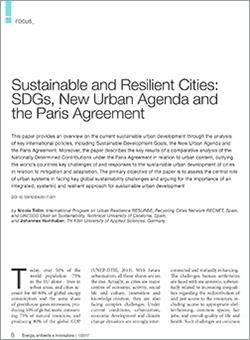
Sustainable and Resilient Cities: SDGs, New Urban Agenda and the Paris Agreement
by Nicola Tollin, International Program on Urban Resilience RESURBE, Recycling Cities Network RECNET, Spain, and UNESCO Chair on Sustainability, Technical University of Catalonia, Spain - Johannes Hamhaber, TH Köln University of Applied Sciences, Germany
DOI 10.12910/EAI2017-001
This paper provides an overview on the current sustainable urban development through the analysis of key international policies, including Sustainable Development Goals, the New Urban Agenda and the Paris Agreement. Moreover, the paper describes the key results of a comparative analysis of the Nationally Determined Contributions under the Paris Agreement in relation to urban content, outlying the world’s countries key challenges of and responses to the sustainable urban development of cities in relation to mitigation and adaptation. The primary objective of the paper is to assess the central role of urban systems in facing key global sustainability challenges and arguing for the importance of an integrated, systemic and resilient approach for sustainable urban development
Today, over 50% of the world population -75% in the EU alone - lives in urban areas, and cities account for 60-80% of global energy consumption and the same share of greenhouse gases emissions, producing 50% of global waste, consuming 75% of natural resources, and producing 80% of the global GDP. With future urbanisation, all those shares are on the rise. Actually, as cities are major centres of economic activity, social life and culture, innovation and knowledge-creation, they are also facing complex challenges. Under current conditions, urbanization, economic development and climate change dynamics are strongly interconnected and mutually enhancing.
The challenges human settlements are faced with are systemic, substantially related to increasing inequalities regarding the redistribution of and just access to the resources, including access to appropriate shelter/housing, common spaces, fair jobs, and overall quality of life and health. Such challenges are common for both developed and developing countries, with different paths and intensity, but nevertheless two sides of the same coin. …

